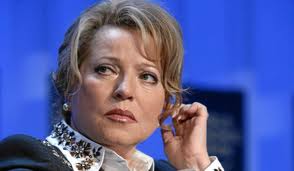
Moscow Tentatively Agrees to Consider Syrian Circassians’ Relocation
Publication: Eurasia Daily Monitor Volume: 9 Issue: 35
By:

On February 11, over 1,000 Circassian activists gathered in Maikop, Adygea, to discuss the issue of repatriating Circassians from war-torn Syria. In a special declaration passed at the conference, the participants called on the Russian government “to take the Circassians-compatriots living in Syria under its protection and patronage” and provide assistance to those who want to relocate to the North Caucasus. The signatories of the appeal to the Russian government noted the increasing hazards to the safety of Circassians living in Syria that could only be effectively alleviated through their relocation to the North Caucasus (https://www.elot.ru/main/index.php?option=com_content&task=view&id=2751&Itemid=1, February 15).
For the first time, Russian officials reacted to the repeated requests for assistance by Circassian activist groups. On February 17, a source in the Federation Council, the upper house of the Russian parliament, told the Russian news agency RBK that its leadership “is carefully examining the address by the republic of Adygea to the Federal Assembly about assisting the Syrian Circassians to return to their historical homeland.” On the same day, February 17, the head of the Federation Council, Valentina Matvienko, held a meeting with the heads of the regional parliaments of Karachaevo-Cherkessia and Kabardino-Balkaria and these republics’ representatives in the Federation Council. The deputy speaker of the Council, Ilyas Umakhanov, a deputy from Dagestan, also took part in the meeting. Matvienko explained that she wanted to evaluate public opinion about the Syrian Circassians’ possible return to the North Caucasus (https://www.rbc.ru/rbcfreenews/20120217160547.shtml, February 17).
Valentina Matvienko has been known for her close ties to Prime Minister Vladimir Putin, so her statements are of interest. However, it can be safely assumed that she is not going to be a decision maker in this particular situation. It is unclear why Matvienko called for this meeting. On the one hand, she stated that Russia was not indifferent to the plight of Syrian Circassians. Moreover, following the meeting it was decided to send a Federation Council delegation to Syria to explore the situation on the ground and to deliver a cautious message of support. On the other hand, much of Matvienko’s instructions were about keeping down the tone about Circassians’ return and avoiding the “politicization” of the issue. So while the Russian government appeared to be taking some kind of action in support of the Syrian Circassians, at the same time, it tried to limit the public’s involvement and the galvanization of the Circassians. It is plausible that the Russian leadership is trying to postpone any decision on resettlement until after the Russian presidential elections on March 4 to avoid any backlash against Putin at the ballot box (https://council.gov.ru/inf_ps/chronicle/2012/02/item18855.html, February 17).
The Russian government still appears to be undecided about whether or not to help the Circassians from Syria to relocate to the North Caucasus. Moscow may find it beneficial to its interests to favor the Circassians’ repatriation to the North Caucasus. This would enhance Moscow’s ability to soften the Circassians’ opposition to the Olympics in Sochi. But any significant number of Circassian returnees would also make it harder for Moscow to continue the isolation of the North Caucasus from the outside world and undercut its control over a region already spinning out of its grip. Simply ignoring the Circassians is probably also not an option for Moscow, as even its loyalists among the Circassian activists, such as Asker Sokht, leader of the Circassians in Krasnodar region, lent support to the idea of repatriating the Syrian Circassians (https://adygeia.kavkaz-uzel.ru/articles/201031/, February 12).
The Federation Council’s website displayed a much more receptive attitude to the Circassians’ claims than usual, stating that there are over 3 million expatriates from the Caucasus living in the Middle East. It further recognized that “their ancestors left the Caucasus as a result of the war in the nineteenth century.” It also repeated the widely circulated estimate of the size of the Circassian diaspora in Syria, which puts it at 100,000 people (https://council.gov.ru/inf_ps/chronicle/2012/02/item18855.html, February 17).
Meanwhile, the situation in the Circassian-populated lands in the North Caucasus remains tense. On February 16, a counter-terrorism operation regime was introduced in the town of Nartkala, Kabardino-Balkaria, northeast of the republic’s capital Nalchik. Three suspected rebels were killed during the police operation. According to police reports, the rebel group was involved in the earlier attack on Antemirkan Kanokov, the head of the Urvan district of Kabardino-Balkaria and a cousin of the head of republic, Arsen Kanokov. Antemirkan Kanokov was injured in the attack. The counter-terrorism operation regime was lifted in the evening of February 17 (https://kavkaz-uzel.ru, February 17).
The authorities in Kabardino-Balkaria also appear to be intent on fueling civil war in the republic. On February 18, relatives of slain servicemen held a rally in Nalchik dedicated to the 400 years since the “voluntary accession of Kabarda to Russia.” Relatives of the slain police and security services personnel shamed and blamed the relatives of insurgents in their speeches. Relatives of insurgents, who were not at the rally, tried to strike a conciliatory note, calling on all people to unite (https://kabardino-balkaria.kavkaz-uzel.ru/articles/201428/, February 18). As authorities lose their hold on public opinion in Kabardino-Balkaria, they appear to be increasingly relying on the strategy of playing groups off against each other. Given the history of how the Circassian population was drastically decimated by Russia in the North Caucasus in the nineteenth century, the notion of the Circassians’ “voluntary accession” to the Russian Empire is out of place. Yet Moscow is persistently trying to impose its own version of history on the North Caucasians.
As the Circassians voice their concerns about the state of their ethnic brethren in Syria, Moscow is still trying to show concern, but also avoid any serious moves. This tactic, however, promises further alienation of the Circassians from Moscow and continuing destabilization in the region.




